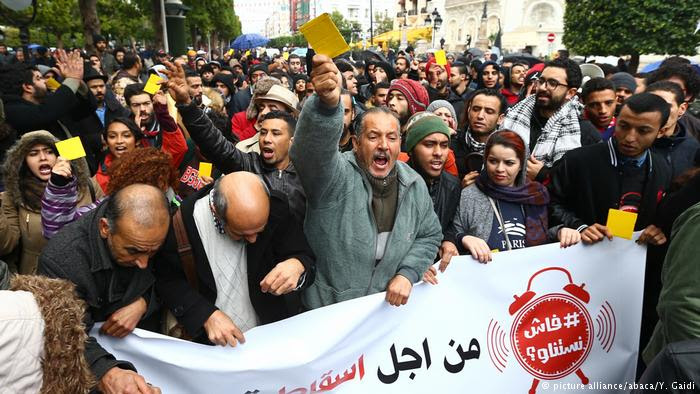Deutche welle germany
Hundreds of Tunisians have continued anti-government protests, with authorities arresting dozens of people. But the government said protests appeared to be slowing ahead of the Arab Spring anniversary.
Tunisian police arrested another 150 people, including local opposition leaders, on Friday even as a series of week-long protests against price and tax rises appeared to diminish in intensity and numbers.
The latest arrests bring the total number of people detained to nearly 800, raising concerns that people are being arrested arbitrarily.
“The protests have declined and there was no damage, but last night the police arrested 150 people involved in rioting in the past few days, bringing the total number of detainees to 778,” said Interior Ministry spokesman Khelifa Chibani.
Sixteen “Islamist extremists” were among those arrested, he said.
Read more: Is there a trade-off between a strong economy and democracy?
Clashes earlier in the week were more violent. Dozens of government buildings were set alight and at least one protester was killed, prompting the government to dispatch the army to several cities and towns.
The United Nations has called on the government to refrain from arresting people arbitrarily.
“We’re concerned about the high number of arrests … around a third of those arrested were between the ages of 15 and 20, so very young,” said UN human rights spokesman Rupert Colville, speaking to reporters in Geneva.
“We call on the authorities to ensure that people are not arrested in an arbitrary manner and that all those detained are treated with full respect for their due process rights and are either charged or promptly released,” he said.
Protests against austerity measures
The protests began Monday, ahead of the seven-year anniversary of the Arab Spring. The pro-democracy uprising began in Tunisia on January 14, 2011.
Tunisia is widely considered to be the only real success story of the Arab Spring, as the only country that didn’t revert to authoritarian rule or descend into civil war. But the economy has struggled and people are angry over the government’s latest austerity measures.
Waving yellow cards — an echo of the “warning” card” flashed by soccer referees — protesters marching on administrative offices in the capital, Tunis, on Friday demanded the government reverse austerity measures implemented at the start of the year.
“The people want the Finance Act repealed” and “The people are fed up with the new Trabelsi,” they shouted, referring to the corruption-tainted in-laws of ousted president Zine El Abidine Ben Ali.
“The people’s money is in the palaces, and the children of the people are in the prisons,” read one placard.
Human rights group Amnesty International has accused Tunisian authorities of using “increasingly heavy-handed methods to disperse rallies and subsequently arrest protesters” during the unrest.
“Tunisian security forces must refrain from using excessive force, and end their use of intimidation tactics against peaceful demonstrators,” Amnesty said.







